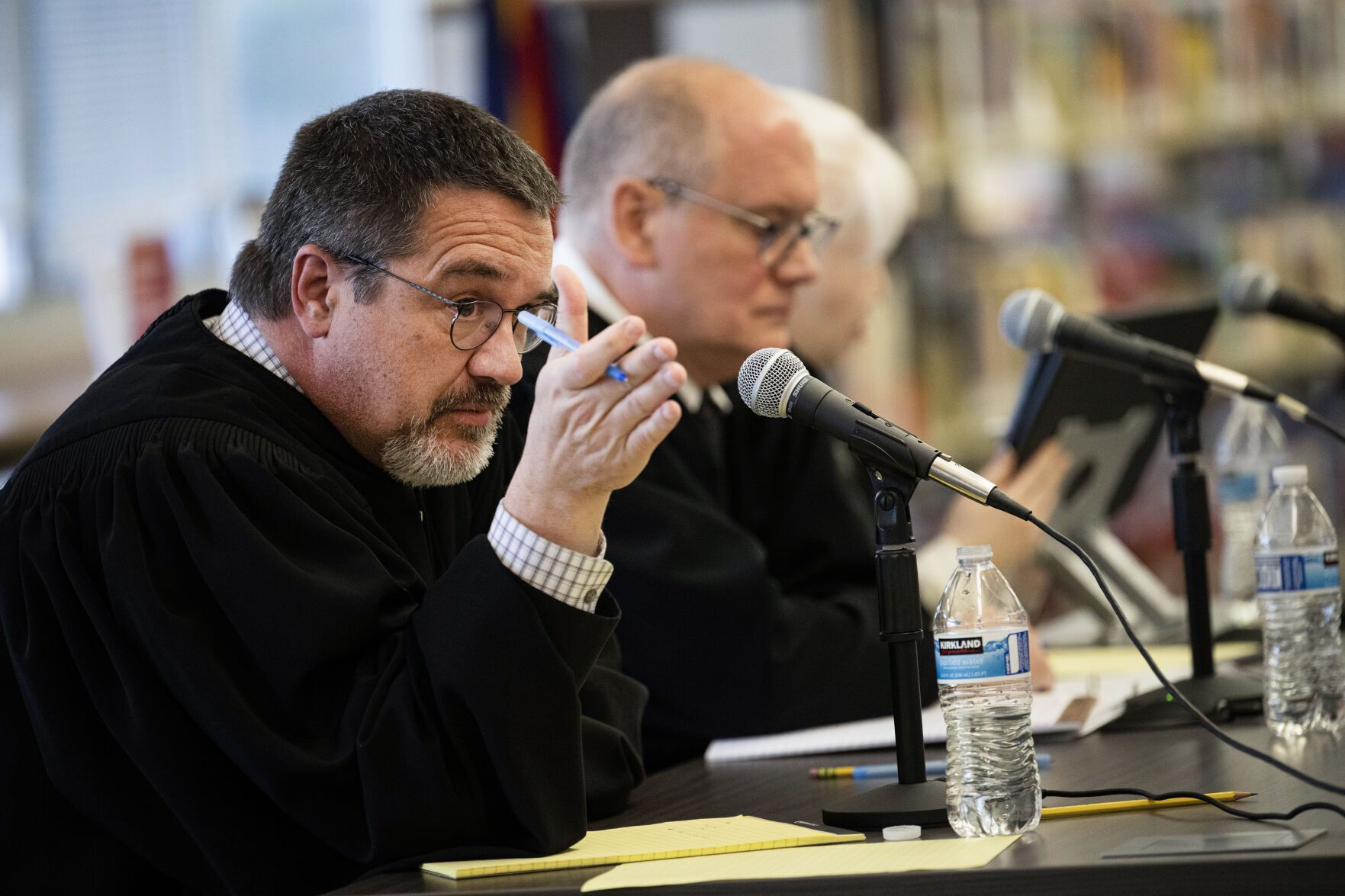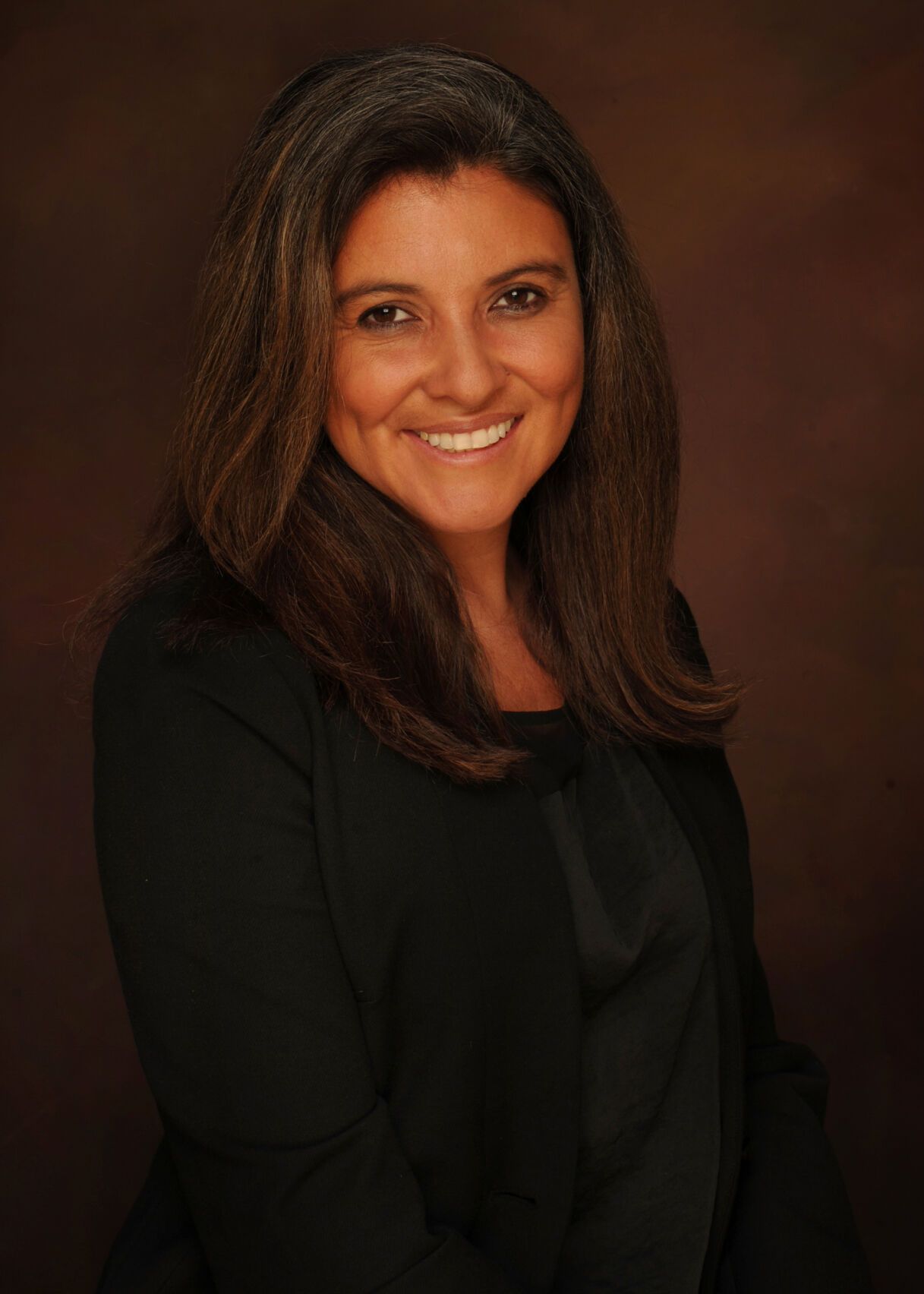Members of Colorado’s state and federal judiciary held a series of discussions with lawyers on Friday that touched on attorneys’ ethical obligations, the responsible use of artificial intelligence and generational differences in the legal profession.
“The world has changed very dramatically since we started practicing. It’s much more competitive,” said Justice Richard L. Gabriel.
The event, sponsored by the Colorado Bar Association, revolved around multiple scenario-based discussions. Gabriel, along with head attorney regulator Jessica E. Yates, walked attendees through a scenario in which an opposing counsel files a motion without citing clear Colorado Supreme Court precedent that undermines their argument.
“You could have a client who says, ‘File an answer and they’ll look like fools in front of the judge,’” said Gabriel.
Colorado Supreme Court Justice Richard L. Gabriel asks a question during oral arguments in the Martinez v. People case during Courts in the Community on Thursday, Oct. 26, 2023, at Gateway High School in Aurora, Colo. (Timothy Hurst/Denver Gazette)
Yates said another option is to call the opposing lawyer and point out the omission.
“As long as you’re not putting a quid pro quo on the line, that’s not a violation of the ethics rules,” she said. “You just can’t try to leverage this into something else. When we see stuff that worries us, it’s ‘I think you violated the rules of professional conduct and unless you withdraw that pleading, I’m going to withdraw the settlement offer I put on the table last week.’”
Yates also responded to an attendee’s comment that younger lawyers seem to behave in a more “scorched earth” fashion than their predecessors.
“Don’t underestimate the fact that they might not know any better,” said Yates. “Just finding non-judgmental ways of bringing them along to other ways of approaching an issue might be beneficial. They’re feeling really stressed out, sometimes they’re feeling isolated.”
“There’s a lack of mentoring because there’s such a focus on law as a business as opposed to law as a profession,” added Gabriel.
Another hypothetical scenario focused on a transgender litigant who the opposing side repeatedly misgenders while in court.
Judge Ted C. Tow III of the Court of Appeals said the key is to recognize the litigant’s gender is a matter of identity, not of preference. Tow spoke about a friend who has the same given name as his father, but does not use the nickname his father goes by because the father used to abuse him.
“That’s triggering to him,” said Tow about his friend. “It’s not trivial at all. And we don’t know what is or isn’t triggering for someone.”
 Colorado Court of Appeals Judge Ted C. Tow III asks a question to Assistant Attorney General Jaycey DeHoyos, not pictured, during oral arguments held in the library of Conifer Senior High School as part of the Courts in the Community educational outreach program on Tuesday, May 16, 2023, in Conifer, Colo. (Timothy Hurst/Denver Gazette)
Colorado Court of Appeals Judge Ted C. Tow III asks a question to Assistant Attorney General Jaycey DeHoyos, not pictured, during oral arguments held in the library of Conifer Senior High School as part of the Courts in the Community educational outreach program on Tuesday, May 16, 2023, in Conifer, Colo. (Timothy Hurst/Denver Gazette)
He also described a case he presided over as a trial judge in which he formally addressed a litigant as “Mr. Smith,” only for the man to protest.
“Mr. Smith is my slave name. My name’s Luke,” the litigant said.
“Initially, I fought it,” continued Tow. “I said, ‘In my courtroom, we use honorifics and decorum.’ And he said ‘My name’s Luke.’ I thought, ‘We’re not getting where we need to get. So, OK, Luke….’
“If he wants to be called Luke, that is decorum. That is respectful,” said Tow. “I’ll call him Luke. And we were actually able to finish the 10-minute phone call.”
The lesson, he said, is to meet people where they are, but also to avoid letting a smaller fight derail the larger courtroom dispute that needs to be addressed.
Attendees also discussed what obligation a lawyer has to speak up on behalf of someone who is addressed incorrectly. Tow raised a recent example from his court, in which a lawyer called a female judge “honey” during oral arguments.
“Other judges were like, ‘Do I speak up or not, or do I let the judge handle it herself?’” he said.
The lawyer in question apologized to the judge in the moment and quickly submitted a letter apologizing to all of the judges hearing the case and his opposing counsel.
In another scenario, attendees considered what should happen if they discover their opposing counsel has filed a motion that contains “hallucinations,” meaning fake quotations or citations generated by an artificial intelligence tool.
U.S. Magistrate Judge Maritza Dominguez Braswell said if she had seen fake quotes in a legal submission five years ago, she would have assumed the lawyer copied and pasted something negligently. She saw AI-hallucinated citations as falling in the same category.
 U.S. Magistrate Judge Maritza Dominguez Braswell
U.S. Magistrate Judge Maritza Dominguez Braswell
“That’s the fundamental problem in my mind, is the lack of verification,” said Braswell. “I don’t see the technology piece as changing the equation that much.”
She acknowledged there is a danger that judges will see an attorney as less credible for getting caught using AI hallucinations, which will affect the client’s case. But Braswell also suggested there is a “chill” around AI use that can be overcome if lawyers and judges practice with the new technology in circumstances that are not high-stakes.
“Definitely explore and experiment, but do it safely, responsibly. I like to think of different risk categories. For me, a lower risk category might be an area of law I know well,” she said. “I know the law well enough to spot (a mistake).”
Attendees suggested different ways a lawyer should respond after catching an AI hallucination, ranging from contacting their opposing counsel and telling them privately to calling it out in their own court filings.
“I do think common courtesy and professionalism should prevail regardless of the situation we find ourselves in,” said Braswell.


